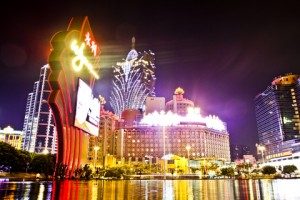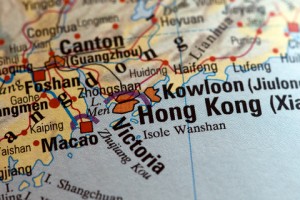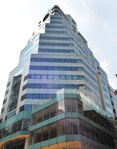
[Updated Oct 2020] A guide to serviced offices and office space for rent in Macau as well as general information that may be useful if you are considering renting office space in Macau.
For further Macau office space information or to search for office space for rent in Macau just click. Or contact us for any other office space query.
History & Geography
The city island of Macau lies on the mouth of the Pearl River bordering Guangdong Province and is flanked by the South China Sea to the east and south of the island. Partly due to its geography, Macau has often been at the nexus of Chinese-European contact, a fact which has resulted in the city being, along with Hong Kong, one of two so-called Special Administrative Regions. Macau started life as a small fishing community but did not really expand into a settlement of any note until the arrival of Portuguese traders in the 16th century. Macau gradually expanded as the traders built permanent warehouses and residential buildings on the island and trade with China flourished. In the 17th century, the Dutch tried to seize Macau for themselves but were beaten off by the Portuguese. In 1840, following Britain’s victory in the Opium War, the Chinese finally granted permission for Macau to become self-administrating. In 1887 the Sino-Portuguese Treaty of Amity and Commerce was signed, which in effect ceded Macau to Portugal in perpetuity. The city also became an important part of the Opium trade, where opium grown in British India was traded for Chinese tea at enormous profits. During WWII the Japanese respected the neutrality of Portugal and didn’t seize Macau, unlike the other European colonies of Hong Kong, Indochina and others. In 1974 the Portuguese dictatorship was overthrown in Lisbon and the new government decided to give up all foreign territories. In 1986 China and Portugal signed an agreement that would see the territory handed over to China in 1999. During the 1990s however a gang war between the city’s influential triad gangs broke out, and Macau gained a reputation for lawlessness and violence. When the Chinese took over in 1999 they cracked down hard on the gangs and the violence petered out. Today the city is a major tourist attraction and home to some of the largest casinos in the world.
Gambling
More than any other city on earth, even Las Vegas, Macau’s raison d’etre is gambling. Macau relies heavily on tourism and the industry makes up 70 percent of government revenues. Often called ‘the Monte Carlo of the Orient’ Macau made gambling legal in the 1850s and the industry has been a staple of the economy since, attracting millions of visitors every year, mostly from mainland China. During the 1960s the government granted a gambling licence to Sociedade de Turismo e Diversoes Macau (STDM) a company headed by Hong Kong businessman Stanley Ho, effectively giving him control of the entire industry. During this time it was rumoured that organized crime played a large part in the running of the industry and Ho has in the past been accused of links to the Triads. However, after the handover to China, licences were granted to large foreign casinos from Las Vegas and Australia, including Wynn Resorts and Las Vegas Sands. In 2007 Macau exceeded Las Vegas in gaming revenues. A recent World Tourism Organization report ranked Macau as the 21st most visited city in the world by the number of tourists. In 2007 alone the city had 27 million visitors, with about 50 percent from China and 30 percent from Hong Kong. As well as the casinos themselves horse and dog racing are also immensely popular in Macau.

Economy
During the last years of the Portuguese administration, a concerted effort was made to diversify Macau’s economy as it was felt it was too reliant on tourism and gambling. Some of this diversification was sought through foreign investment, however much of this ended up going to the gaming sector. However Macau does has a large textile industry, providing about three-quarters of export earnings. The city is also a thriving offshore financial centre, tax haven and free port which has no foreign exchange or control regimes. Offshore finance is overseen by the Monetary Authority of Macau and investment services are provided by the Macau Trade and Investment Promotion Institute. Macau was recently upgraded by Moody’s to AA3 from A1 due to the government’s sturdy finances. The city also has five of the top 500 banks in Asia, the two most predominant being Banco Tai Fung and the Industrial Commercial Bank of China.
Transportation
Buses and taxis are the favoured form of transport in Macau and both forms of transport are cheap and efficient. Many visitors to the city favour the trishaw for tours, a combination of a rickshaw and tricycle. The Outer Harbour Ferry Terminal provides transportation for those travelling between Macau and Hong Kong and is one of the busiest terminals in the region. The Yuet Tun Terminal serves ferries going between Macau and cities in mainland China such as Shekou and Shenzhen. Macau is also served by Macau International Airport, which serves approximately 5 million people per year.

Office space to rent in Macau
Currently, Macau’s property market is seen as being relatively underdeveloped. The city is not expected to see any new property supply until 2013 when projects in Praia Grande are complete. This is mostly due to the fact that the market is trying to absorb excessive stock, which also explains the vacancy rate currently at 25 percent. The current average rental price for Grade A office space in the central zone is at 13-15 Macau Patacas per square foot per month. Occupier demand is expected to pick up with the construction of Hong Kong-Zhuhai- Macau Bridge, however, it is not known whether this will be significant enough to have a major impact on the market.
We carry out a free office space search and our advisory and acquisition services are also free, always. Our Macau office space brokers and agents are globally regulated by the Royal Institution of Chartered Surveyors (RICS) ensuring the highest standards of commercial property advice and service at all times. We look forward to helping you find the best office space for rent for your business.

The Office Providers are Regulated by the Royal Institution of Chartered Surveyors (RICS)